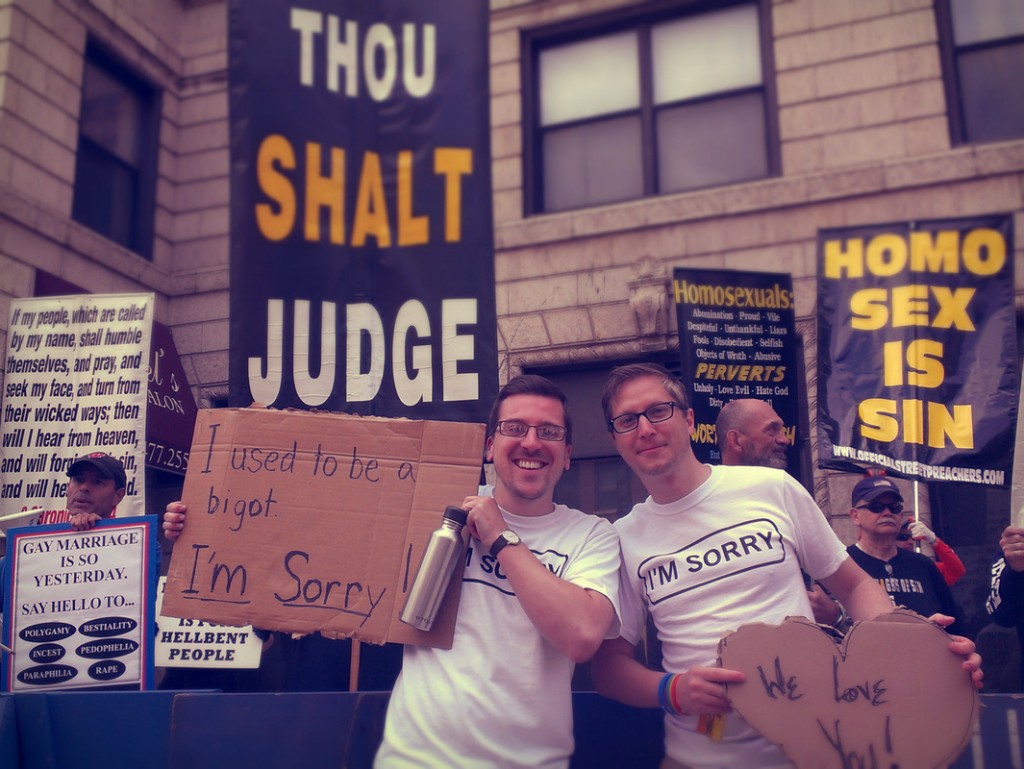 The following post is by Jason Bilbrey, Director of Pastoral Care at The Marin Foundation. You can read more from Jason at his blog, www.jasonbilbrey.com.
The following post is by Jason Bilbrey, Director of Pastoral Care at The Marin Foundation. You can read more from Jason at his blog, www.jasonbilbrey.com.
I was recently having lunch with a friend. Great guy. Conservative in a mainstream Evangelical way and also really bright, reasonable and charitable. I’ve known him for years. We were talking about (what else, right?) homosexuality and the LGBT community.
“I never know how to engage in this conversation,” he said. “It’s not like I don’t have strong convictions, I’m just hesitant to voice them. I don’t want to be–”
“Labeled a bigot?” I asked.
“Exactly!”
I could finish his thought not so much because we’re great friends–though we are–but because this is a sentiment I’ve heard again and again from other conservatives I talked to. This particular epithet, “Bigot,” seems to strike a nerve.
I’m sure this is good news to many LGBT folks and their allies. As public opinion shifts in favor of gay rights and marriage equality, perhaps it’s time for those holding to a traditional/conservative stance on the issue to be the recipients of stigma, rather than the perpetrators. And I can’t deny that there’s a part of me that finds this turning of the tables deliciously ironic.
And yet, sitting in my friend’s living room, I looked at him and said, “You’re not a bigot.” To me, it’s not a conservative/traditional stance on homosexuality that makes you a bigot. It’s how you act on those beliefs. In other words, bigotry is not a thought, it’s an expression.
Let me be the first to say that this is not a water-tight definition. If I make the comparison to, say, civil rights, I could easily see how someone might be deemed a racist simply for believing that black folks should be excluded from the rights and privileges that white folks enjoy. You wouldn’t have to act on that belief, necessarily, to earn the label of “racist.” I can see how a similar kind of labeling might befit someone who simply believes that LGBT folks should be excluded from the rights and privileges straight folks enjoy.
But to parse out the difference between beliefs and actions, let me offer a few counterexamples:
1. I’m a feminist. I believe that women are equally capable and deserving as men to hold positions of power. So my wife and I are pretty egalitarian and non-traditional in our marriage. She works full-time and does the finances (she’s better at them), and I’m the primary caregiver to our daughter. Now, we have many married friends who have a defined set of gender roles and expectations. For them, the husband is the head of the house. I can roll my eyes every time the wife talks about “submitting to her husband in love” (without the qualification that he should reciprocate), but at the end of the day, I have to look at how their marriage functions and whether or not they honor each other. In other words, I’m pretty hesitant to label the guy a “misogynist” or “sexist” if the expression of his beliefs about gender differences speak to his love for his wife.
2. I’m a pacifist. I believe killing people is always wrong. But I fully realize that that belief, if inappropriately expressed, could earn me any number of undesirable labels (ingrate, apostate, a**hole), especially on days like Veterans Day, which our nation celebrated just last week. I can be a pacifist and still acknowledge and voice my gratitude for those who served our country protecting freedoms that I enjoy everyday (many in my own family). I would argue it’s not my conviction about non-violence itself that warrants any of those undesirable labels, it’s how I act on it. It’s not the what. It’s the how, when, why and to whom.
Likewise, to me the term “bigot” seems best reserved for those who manifest their conservative beliefs about homosexuality in ways that seek to offend, defame or impoverish the LGBT community. It’s not that anti-gay beliefs in and of themselves are harmless, but bigotry is a strong term and it should be a designation of equally strong characteristics.
Ok, I’ve made my case for a working definition of bigot: not beliefs, but harmful expressions of those beliefs. Here’s one caveat to my definition: it’s hard to imagine someone having conservative/traditional beliefs about homosexuality going their whole life without ever giving harmful expression to those beliefs in some (perhaps unintentional) way, especially with marriage for gay and lesbian individuals showing up in more and more ballot boxes across the country. (Did I mention my definition isn’t water-tight?)
I’m not out to police people’s appropriation of certain terms, and I do think there is a time to use strong and inflammatory language. (Case in point, I used the word “bigot” in the picture above, which was taken at TMF’s I’m Sorry Campaign during Chicago’s Gay Pride Parade). But I think Brent’s post last week is spot on. Strong language risks coming across as alienating, dismissive and conversation-ending.
I told my friend, the not-a-bigot one, that if we had a mutual friend who was gay, I couldn’t imagine there would be any difference between the way he and I treated that person. He agreed. And to me, that’s what it all comes down to. I don’t care what you think about same-sex relationships and intercourse. I don’t care what you believe about the LGBT community. I don’t care how you define marriage. What I care about is how you manifest those convictions.
So, I’m going to toss all this out to you, dear readers. How do you personally define the word bigot? What am I missing? What’s wrong about my definition? What’s right about it? I’ll meet you in the comments.
Much love.












